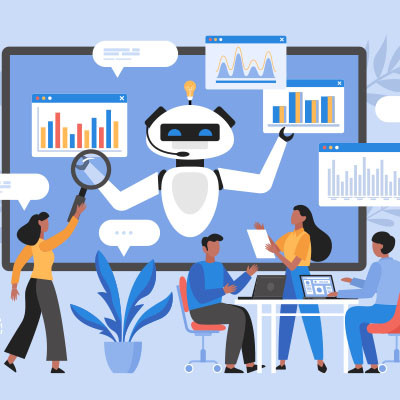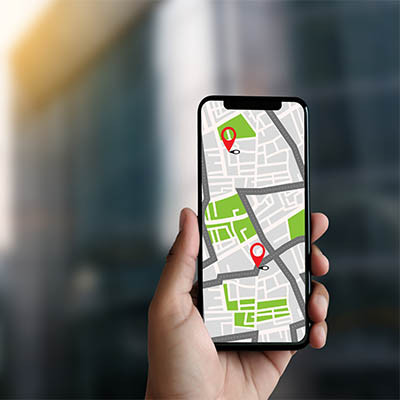The Internet is a staple in most offices around the world, and you’d be hard-pressed to find one that doesn’t rely on it in some fashion. A big part of seeing success with the Internet depends on your bandwidth, as well as your network’s capacity to reach the capabilities of your Internet service provider. Today, we want to break down what bandwidth is, as well as how you can make the most of your Internet package.
Argentum IT LLC Blog
In recent years, there has been much debate about how companies collect, sell, and use personal data. Many businesses make extra money by selling data they collect about people. This might seem like a side effect of all the data we create online, but it can lead to some tricky problems. Today, we'll look at something called the "data-broker loophole," how it works, and what we can do about it.
Over the past few years, artificial intelligence has become a bona fide buzzword amongst businesses of all sizes, with 97% of respondents to a Forbes survey seeing a potential benefit in some way, shape, or form. However, with it being integrated everywhere in our modern lives, it is important that we remember that AI is still a human invention, as such, it is vulnerable to our own implicit biases.
Any business can benefit from data and use it to improve its operations. This is especially the case where information technology is involved. By collecting the right metrics, you can better evaluate your business IT’s performance and identify areas for improvement.
Let’s review what some of these metrics should be.
In 2004, a service called VirusTotal was launched and swiftly became a popular antivirus and malware scanner to help detect threats in various files and URLs. It became popular enough that it was officially acquired by Google in 2012 and ultimately assimilated into Chronicle, a cloud-based security operations suite for enterprise businesses. Despite this impressive pedigree, however, we find ourselves able to look to VirusTotal as a sobering reminder of how fickle cybersecurity can be, with the service being the source of some limited data exposure.
You’re probably familiar with the concept of a mission statement, particularly in terms of your business as a whole. Did you know, however, that you don’t need to stop there? You can—and we’d argue, should—establish more specific organizational missions for your different departments. Let’s consider how you can benefit from creating a mission for your IT team to uphold throughout its operations, and how you might go about doing so.
Information technology is a constantly changing industry, with practices shifting all the time. As a result, anyone you have working on your company’s IT should be actively seeking out various certifications to confirm that they are keeping up on modern trends and standards. To help you accomplish this, we’ve put together a brief list of valuable IT certifications that your IT personnel—whether they’re in-house employees or outsourced professionals—should have.
Who are you? While it’s a question that’s been asked in all contexts with all levels of metaphysicality attached—from asking someone their name to prompting someone to follow a path of spiritual self-discovery—the growth of the metaverse once again urges us to ask it in a more literal way. When accessing a conglomeration of various services and platforms, how many identities will each user need to juggle?
If Edgar Allan Poe worked in an office, here’s what one of his works would sound like:
True!—nervous—very, very dreadfully nervous I have been and am, but why will you say that I am mad? The office had sharpened my senses—not destroyed—not dulled them. Above all was my sense of hearing. I heard all things in heaven and on earth and many things in…the other place. So, how then am I mad, especially when I can so healthily and calmly tell you this story?
Google Workspace is a great tool that allows you to get a lot done, but sometimes you might find yourself in a position where you need to download the files and take them with you or send them to someone. In these cases, you might not want to share the link. Instead, you can simply download them as whatever file format you might need!
When we talk about data privacy in a business, the default is to generally think about the data the business has collected and compiled from its clientele. However, that’s just one type of data a business has. There’s also a lot of data that is collected by the business about that business’ employees. So, how well protected is this data?
Keeping your data protected is a huge concern nowadays, with more and more safeguards needed to prevent it from being exfiltrated. Encryption is a great way to prevent your data from being any good to those who might steal it. Let’s review what encryption is, and delve into how it works in practice.
Remote work has been embraced over the past two years, in no small part due to the impact of the pandemic. However, some of the impacts of remote work have made it clear to many businesses that its advantages shouldn’t be sacrificed once it is no longer necessary. Let’s review how businesses can improve by continuing the practices of remote work, even after the need for remote work has passed.
While we cannot express how important it is to update your software and hardware in a timely manner, it is important to keep in mind that some of these updates aren’t going to be perfect. An upcoming update to Google Workspace serves as the perfect example, as the company has recently released an alert to inform users about an issue affecting Google Drive.
Did you know that maps as we know them are remarkably skewed? Due to some centuries-old superiority complexes and prejudices, the maps we’ve all been raised looking at have never been completely accurate. However, this problem could soon be an element of cybercrime thanks to a developing technology that many have yet to take seriously, deepfake images, and how they could revolutionize cyberattacks moving forward.
Your business’ data is perhaps its most crucial resource—which is why it is so important that it remains protected against all threats (including those that come from within your own business). Consider, for a moment, the ongoing trial of Xiaorong You, going on in Greenville, Tennessee. Accused of stealing trade secrets and committing economic espionage, You allegedly stole various BPA-free technologies from various companies—including Coca-Cola and the Eastman Chemical Company, amongst others—to the tune of $119.6 million.




















